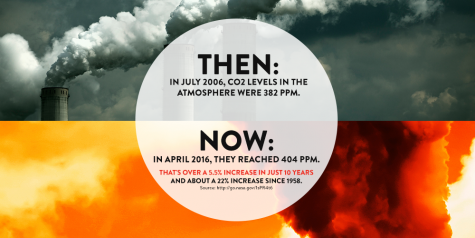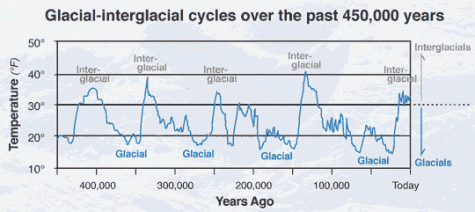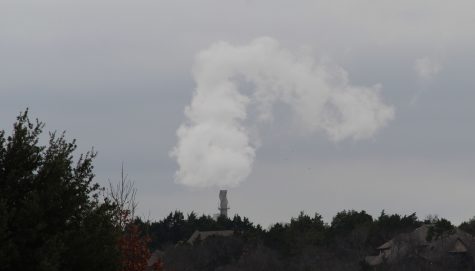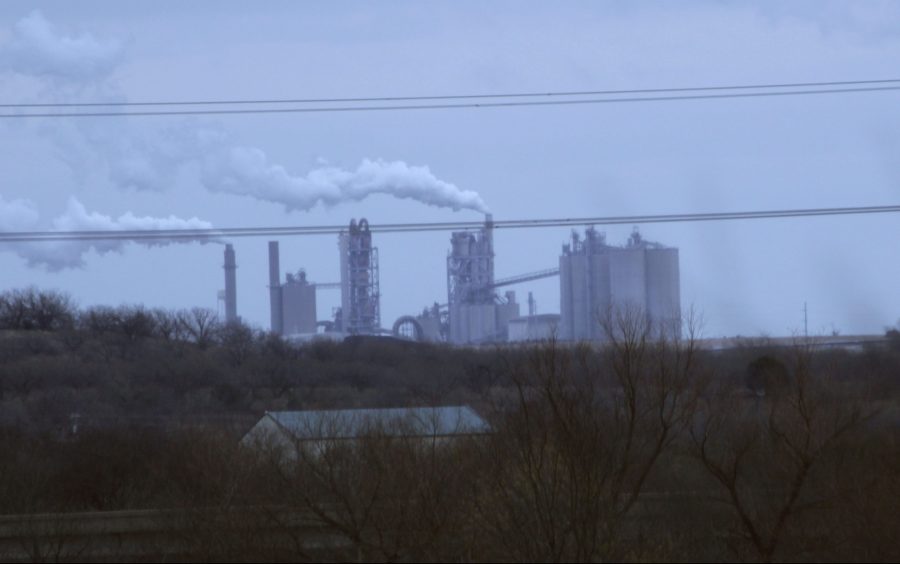Baby, it’s Warm Outside
The Martin-Marietta Cement Plant in Midlothian is a important fixture in the DFW skyline.
As the seasons change from Autumn to Winter, habits and tendencies do as well. Visions of hot chocolate, warm coats, and a crackling fireplace are most common around this time, but it seems that a cold drink, shorts, and light air conditioning might be more appropriate.
According to the National Oceanic and Atmospheric Administration, the month of October has been 0.10 degrees fahrenheit above average in North America. While this might not seem like a significant difference, the current erratic forecasts signal a strange climate shift, even for Texas.
This isn’t just a recent occurrence, this warming trend has been going on for a while. According to the Environmental Protection Agency, 8 of the top 10 warmest years on record have occurred since 1998, just a 20 year period. These higher temperatures could have a negative impact on us, according to data collected by the EPA, and could result in an international crises.
“More frequent and intense extreme heat events can increase illnesses and deaths, especially among vulnerable populations, and damage some crops. While increased precipitation can replenish water supplies and support agriculture, intense storms can damage property, cause loss of life and population displacement, and temporarily disrupt essential services such as transportation, telecommunications, energy, and water supplies,” per the EPA in 2017.
The cause of this recent climate change has been up for debate by meteorologists, with some blaming the shift on greenhouse gas emissions and global warming, and some believing the change is just a part of the world’s natural warming and cooling cycles. Chief Meteorologist at NBC DFW, Rick Mitchell, points out that many of the warmest winters here in Texas have both occurred while people have been worried about global warming and before people were even considering the possibility.

“When looking at winter temperatures in the DFW area over the last 120 years, the warmest winter was 2016-17 (the months of December through February.) It would be easy to say that was caused by some sort of climate change. However, the second warmest winter on record was 1906-07, long before there were concerns of a changing climate. Out of the top 20 warmest winters, six of them have occurred since 2000,” said Mitchell.
Furthermore, many scientists also claim that it’s near impossible to predict how a specific season, such as the wintertime, will be affected by a variety of factors that might have little to nothing to due with global warming, claims the Chief Meteorologist at FOX DFW, Evan Andrews.
“The bigger player in predicting Texas winter weather is usually the ocean temperature in the Pacific (warmer is El Nino, and colder is La Nina). And that doesn’t guarantee anything except an increase in odds that an event occurs. Historically, an El Nino year leads to a wetter winter here. Temps can go either way, although more clouds can mean cooler temperatures. Once again it’s not a forecast, because forecasting a season in advance is impossible. It’s just looking at the past and saying when we had X there, we got Y here 68% of the time and Z here 32% of the time, so let’s guess Y. As you can tell, I’m not a fan of seasonal forecasting,” said Andrews.
In lieu of the widespread debate in the science world on the topic of climate change and how it effects us in the long run, there is a wide range of opinions that several people have in terms of global warming. People, such as Lake Ridge Junior, Jacob Alvizo, deny that these climate shifts pose any real threat to the human race, and that it’s simply a part of the Earth’s cycles.

“Periodically, the Earth has always had ages when its either extremely hot or extremely cold. I think its just history, because there was an ice age once and scientists say we’re in for another one really soon,” said Alvizo.
Alvizo’s views are also shared by a variety of people from different walks of life. In fact, President Donald Trump, in a 60 Minutes Interview with Lesley Stahl, denied that climate change was caused by humans, and that it was caused by the earth’s natural cycles, much like Alvizo.
“I think something’s happening. Something’s changing and it’ll change back again. I don’t think it’s a hoax, I think there’s probably a difference. But I don’t know that it’s manmade. I will say this. I don’t wanna give trillions and trillions of dollars. I don’t wanna lose millions and millions of jobs. I don’t wanna be put at a disadvantage,” said Trump on 60 Minutes.
As more people begin to believe that climate change isn’t a problem, more people are convinced by believers. Marie Lamkin, AP Environmental Science Teacher at Lake Ridge High School, believes in climate change because of how climate scientists have researched the natural patterns of the Earth’s atmospheric temperatures that span from the beginning of the Earth, as well as what’s different with the increase of temperatures now than that of, say, 400,000 years ago.
“There are some cycles where the planet is cooling down and warming up. But since the industrial revolution, the temperature has been dramatically increasing at an alarming pace,” said Lamkin.

But, despite the debate on the cause of climate change or even its existence, the climate is changing in Texas. While the state has always had unpredictable weather, even stranger forecasts have people like Lamkin and Alvizo still perplexed on its cause. So, without a doubt, the world’s climate is changing, be it getting colder or hotter, wetter or drier, people in Texas need to prepare themselves to keep those flip flops out for a little while longer.


